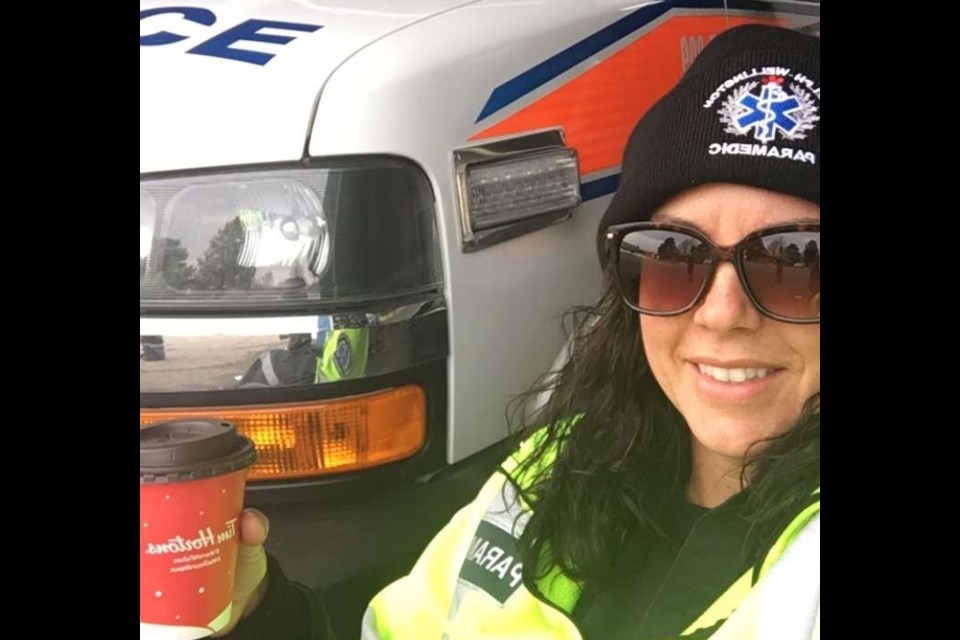For years, paramedics from the Guelph Wellington Paramedic Service start their day by checking reports, examining their trucks and slipping in their uniforms so they’re ready to be out the gate within minutes of a call.
With the virus, things have intensified.
Paramedics are now putting themselves at a higher risk of danger on a daily basis and remaining brave while battling their own anxiety of a global pandemic.
Now, their personal protective gear has increased with goggles, masks, gloves and when necessary, a gown and a face shield. They also spend extra time cleaning their equipment and trucks and carry additional supplies.
When paramedics started responding to more calls, they noticed the difference in the kind of reactions they received.
“In the past, we would be that calming effect for them (patients) when we walked through the door. They would have a sense of relief that ‘Oh help is here,’ and now I think I find it the opposite where we’re there to take their loved one away and they may never see them again,” says paramedic Marsha Sealey who has worked with the GWPS for seven years.
Because patients see paramedics heavily geared — where they can’t see the paramedic smile or even have conversations like they regularly would —, the ability to interact between paramedics and patients becomes challenging.
The paramedics say its important to take extra steps such as holding a patient's hand for an extended period of time or looking into their eyes to help them understand that the paramedics are there to help.
“Looking into eyes, you can tell how genuine a person is even if you can’t see if they’re smiling or not,” says Sealey.
Paramedic Jay Williamson, who has worked with the GWPS for nine years, says being patient with people is crucially important in order to express compassion at a time when people feel alone.
He says because the option of allowing an individual to travel with a patient to the hospital is limited — to individuals like a translator or a support person for someone with Dementia or Alzheimer’s disease — it furthers the level of fear in a patient.
“You’re going to the hospital alone and you’re not going to see your loved one until they come and pick you up at the front door of the hospital,” says Williamson.
And after dealing with every age demographic in the region, Williamson says he sees an increased level of fear in the elderly.
“You see a fear in the elderly eyes with them seeing you with your gear on and you can see that some are confused and anxious,” says Williamson adding that sometimes they have hearing deficits which makes it even harder for them to understand discussions through a mask.
“It’s a matter of slowing things down and communicating effectively and taking that extra bit of time to reassure them that things will be okay,” says Williamson.
When the pandemic began, Sealey says the department saw a decline in call volumes for the first three to four weeks.
“People were a little scared and unpredictive of what was taking place so they were trying to manage their more mild systems at home,” says Williamson.
With families of their own at home, he says they haven't been immune to the anxiety and fear of the pandemic either.
Sealey says she worried about bringing the virus home and even considered temporarily moving away from her husband and sons, 2 and 5 when the pandemic began.
“It has really changed how I come home from work,” says Sealey who immediately changes when she comes home and rushes straight to the shower.
“My kids understand that mom is ‘dirty’ when she comes home and that they can’t really come hug or kiss me until I come out of the shower,” says Sealey.
With an eight week baby and an eight-year-old who is already dealing with a respiratory condition, Williamson says the beginning of the pandemic came with a lot of fear and anxiety with constant exposure to COVID-19 related news in the community and in the media.
With protocols and rules constantly changing, he says it also added extra stress on the job.
“We didn’t know what was to come and how COVID-19 was going to impact us and how it was going to spread," said Williamson.
“You do have that fear if I should be hugging my kids or giving them kisses or holding them.”
As time progressed, Williamson says they were able to find their own comfort level where they just have to believe in what they feel is right.
Sealey and Williamson say the paramedics bond together as a group and it’s really the community support that keeps them going whether it’s people buying them coffee or participating in car rallies around the city.
“Those things are so uplifting and kind of give us an inner strength that what we’re doing is mattering to people,” says Sealey.
With a heightened level of anxiety at the beginning of the pandemic, Sealey says they’re slowly seeing that anxiety decrease as it becomes more routine.
They say it's important to be patient with one another and support one another during this time while the numbers continue to decline and the community feels a sense of normalcy.
“Everyone just needs to take a deep breath and support one another,” says Williamson.
“At one point in time, it will all just be a bad dream.”



